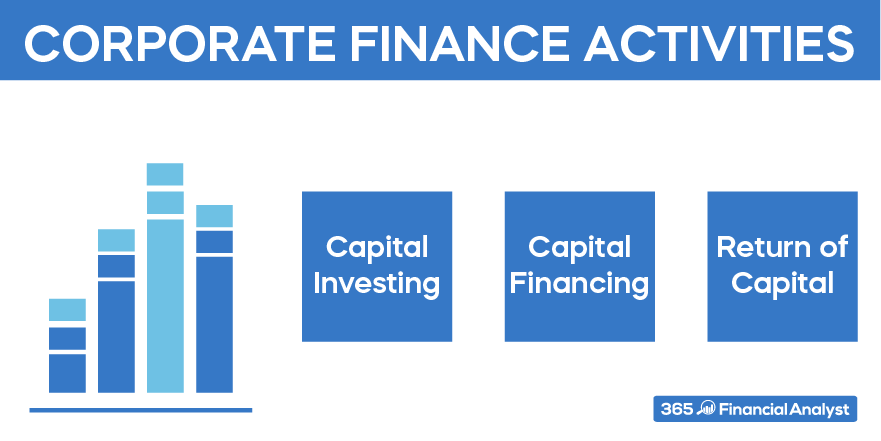What is Corporate Finance?
Join over 2 million professionals who advanced their finance careers with 365. Learn from instructors who have worked at Morgan Stanley, HSBC, PwC, and Coca-Cola and master accounting, financial analysis, investment banking, financial modeling, and more.
Start for Free
While accounting’s various branches all use information about a company’s past to make predictions about its future, it is the role of corporate finance to turn that future into a reality. No surprise then that all upper-tier jobs in Finance fall under this category. Here are all the essentials:
Corporate Finance Definition
Corporate finance is an important subfield of general finance that entails all activities and transactions related to raising and utilizing capital to create, develop, or acquire a business. It also includes all the tools and analyses carried out to prioritize and distribute resources.
In most cases, corporate finance helps businesses and companies find sources of funds crucial to implementing expansion plans. Additionally, it’s responsible for managing day-to-day financials and ensuring healthy profitability.
While corporate finance focuses on maximizing investor value through long- and short-term financial planning, it also pays close watch to capital investments and tax considerations. Therefore, its ultimate goal is to optimize the value of a business through effective implementation and utilization of resources.
In addition, this area of finance is also concerned with monitoring cash flows and the preparation of financial statements. Corporate finance governs and oversees all financial activities and capital investment decisions.
A corporate finance director makes crucial financial decisions that govern daily business operations. The decisions revolve around how to raise and utilize capital. The director must also find ways of effectively allocating capital to enhance return on investments and guarantee shareholder value. In addition, corporate finance directors analyze various opportunities available that a business can tap to increase shareholder value.
Corporate Finance Tasks

Capital Investing
Departments operating under corporate finance oversee all financial activities and capital investment decisions. Some of the key decisions that such departments make include pursuing investment opportunities through effective capital allocation. Making capital investments is one of the biggest tasks they are faced with.
Therefore, they make crucial investment decisions on capital budgeting by ascertaining capital expenditures, estimating future cash flows, and comparing planned investments. Through capital budgeting, such departments identify all capital expenditures and cash flows, analyze planned investments and potential returns.
Capital Financing
Corporate finance also focuses on sourcing capital through equity and debt. In this case, a department determines the cost-effective way of sourcing capital from banks and other financial intermediaries. For corporations, selling stocks or equity to investors is always an option when in need of large amounts of money.
Finding a balance between equity and debt is crucial. For instance, having too much debt may leave the company or business at a higher default risk. On the other hand, relying on equity distribution to raise finances could dilute earnings and early investors’ holdings.
Ensuring sufficient short-term liquidity is also crucial to the day-to-day running and survival of a business. Therefore, corporate finance ensures liquidity is sufficient to support continuing operations. The focus most of the time is on ensuring a business can meet all its current liabilities.
Some of the short-term liquidity options available to businesses include bank overdrafts and credit lines from financial institutions. Businesses and companies also do pursue commercial papers as liquidity options.
Return of Capital
Corporate finance departments also make crucial decisions on whether to pay dividends or retain the excess capital for future investments. Tasked with returning maximum value to shareholders, the corporate finance unit must also decide whether it is in the best interest to pursue stock buybacks in the case of public companies.
Examples of Capital Investing
Investments in working capital allow a company or business to sustain day-to-day operations while investments in fixed assets such as machinery technological upgrades go a long way in enhancing production. For such investments to be made there is a lot of data analytics and foresight that a corporate finance director must undertake. The director will only raise funds when there is a well-justified investment plan.
Examples of Capital Financing
It’s clear that corporate finance is all about raising capital and finding ways to utilize it for optimum returns. Therefore, carrying out an Initial Public Offering presents one of the best routes for a private entity to go public and, in return, raise much-needed capital. The listing of stock or equity in a stock exchange allows an entity to access much-needed capital from the capital market.
Issuing bonds also offers an avenue of raising a long-term loan that can be used to finance business operations or acquisitions. Bonds can be bought and sold in the public market, whereby holders receive interest and are compensated according to the agreed terms. In addition to bonds, a business may opt to secure a loan from a bank or credit line from a financial institution.
Examples of Return of Capital
When it comes to capital distribution through dividends or buybacks, it is the responsibility of the corporate finance department to ensure such operations don’t drain the business or company financially. A balance needs to be struck to ensure that sufficient funds are left behind to support the business and accelerate production for long-term returns.
High-Paying Corporate Finance Jobs
The career paths of corporate finance are some of the best on the employment market, going by the perks on offer.
Chief Financial Officer (CFO)
A Chief Financial Officer is at the helm of any corporate finance department, tasked with managing all the economic actions of a business or company. The tasks revolve around financial planning, tracking cash, and analyzing financial strengths and weaknesses. It is the best paying field around finance, with a national average salary of about $393,000
Corporate Finance Director
With a national average salary of about $160,000 a year, it is one of the most sought-after jobs in the field. The officeholders are tasked with maximizing bottom-line opportunities for an organization. They also identify and secure mergers and acquisition deals.
Controllers
In big companies and corporations, controllers play an important role in developing procedures, financial policies, and reporting systems. They implement policies that protect assets and ensure a corporation attains budget objectives while also integrating financial data. The national average salary in this field stands at about $96,000.
Cost Analyst
Cost analysts are tasked with analyzing expenses and coming up with a module for better management, a key principle in corporate finance. Their role cycles around gathering financial data such as labor costs and inventory purchases. They earn an average of $83,000 a year.
What’s Next?
Very tempting, aren’t they all? Achieving these top-level positions naturally requires years of training and experience, but you can take the first step right now. Sign onto our comprehensive Corporate Finance Course 2022 to start carving your path today!
Ready to take the next step towards a career in Finance?
From foundational topics in Accounting and Financial Analysis, through Corporate Finance and M&A, to specialized Fintech and Economics courses, the 365 Financial Analyst curriculum is designed to prepare you for the world of Finance as it is today. Whether you are a total beginner or a working professional, our expert-led courses offer the opportunity to upskill at your own pace. Find the right fit for you and start learning today!
